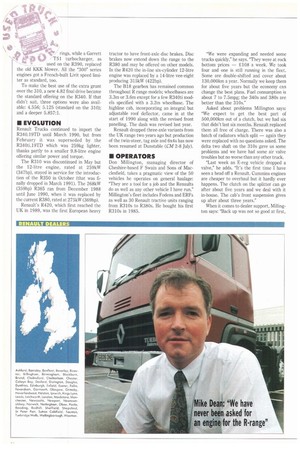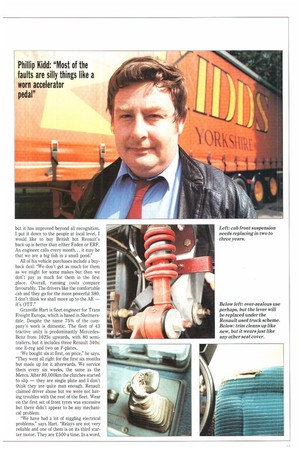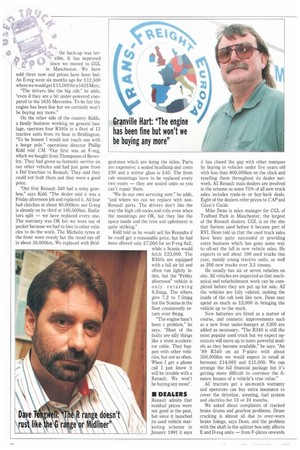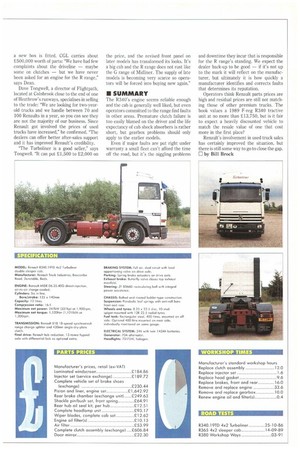, rings, while a Garrett • /T51 turbocharger, as
Page 26

Page 27

Page 28

Page 29

If you've noticed an error in this article please click here to report it so we can fix it.
— used on the R390, replaced the old KKK blower, All the "300" series engines got a French-built Livit speed limiter as standard, too.
To make the best use of the extra grunt over the 310, a new 4.82 final drive became the standard offering on the R340. If that didn't suit, three options were also available: 4.556; 5.125 (standard on the 310); and a deeper 5.857:1.
• EVOLUTION
Renault Trucks continued to import the R340.19TD until March 1990, but from February it was superseded by the R340ti.19TD which was 259kg lighter, thanks partly to a smaller 9.8-litre engine offering similar power and torque.
The R310 was discontinued in May but the 12-litre engine, rated at 259kW (347hp), stayed in service for the introduction of the R350 in October (that was finally dropped in March 1991). The 268kW (359hp) R365 ran from December 1988 until June 1990, when it was replaced by the current R380, rated at 275kW (369hp).
Renault's R420, which first reached the UK in 1989, was the first European heavy tractor to have front-axle disc brakes. Disc brakes now extend down the range to the R380 and may be offered on other models. In the R420 the in-line six-cylinder 12-litre engine was replaced by a 14-litre vee-eight producing 315kW (422hp).
The B18 gearbox has remained common throughout R range models; wheelbases are 3.3m or 3.6m except for a few R340ti models specified with a 3.2m wheelbase. The highline cab, incorporating an integral but adjustable roof deflector, came in at the start of 1990 along with the revised front panelling, The dash was revised last year.
Renault dropped three-axle variants from the UK range two years ago but production of the twin-steer, tag axle and 6x4s has now been resumed at Dunstable (CM 2-8 July).
• OPERATORS
Don Millington, managing director of Cheshire-based F Swain and Sons of Macclesfield, takes a pragmatic view of the 50 vehicles he operates on general haulage: "They are a tool for a job and the Renaults do as well as any other vehicle I have run." Millington's fleet includes Fodens and ERFs as well as 30 Renault tractive units ranging from R310s to R380s. He bought his first R310s in 1985. "We were expanding and needed some trucks quickly," he says. "They were at rock bottom prices — £108 a week. We took four and one is still running in the fleet. Some are double-shifted and cover about 130,000km a year. Normally we keep them for about five years but the economy can change the best plans. Fuel consumption is about 7 to 7.5mpg; the 340s and 380s are better than the 310s."
Asked about problems Millington says: "We expect to get the best part of 500,000km out of a clutch, but we had six that didn't last six months. Renault replaced them all free of charge. There was also a batch of radiators which split — again they were replaced with no questions asked. The delta two shaft on the 310s gave us some problems and we have had some air valve troubles but no worse than any other truck.
"Last week an E-reg vehicle dropped a valve," he adds. "It's the first time I have seen a head off a Renault. Cummins engines are cheaper to overhaul but it hardly ever happens. The clutch on the splitter can go after about five years and we deal with it in-house. The cab's front suspension gives up after about three years."
When it comes to dealer support, Millington says: "Back up was not so good at first, but it has improved beyond all recognition. I put it down to the people at local level. I would like to buy British but Renault's back-up is better than either Foden or ERF. An engineer calls every month... it may be that we are a big fish in a small pond."
All of his vehicle purchases include a buyback deal: "We don't get as much for them as we might for some makes but then we don't pay as much for them in the first place. Overall, running costs compare favourably. The drivers like the comfortable cab and they go for the more powerful 380. [don't think we shall move up to the AE — it's OTT."
Granville Hart is fleet engineer for Trans Freight Europa, which is based in Reimersdale. Despite the name 75% of the company's work is domestic. The fleet of 43 tractive units is predominantly MercedesBenz from 1625s upwards, with 80 semitrailers, but it includes three Renault 340s: one E-reg and two on F-plates.
'We bought six at first, on price," he says. "They went all right for the first six months but made up for it afterwards. We service them every six weeks, the same as the Mercs. After 80,000km the clutches started to slip — they are single plate and I don't think they are quite man enough. Renault claimed driver abuse but we were not having troubles with the rest of the fleet. Wear on the first set of front tyres was excessive but there didn't appear to be any mechanical problem.
"We have had a lot of niggling electrical problems," says Hart. "Relays are not very reliable and one of them is on its third starter motor. They are £500 a time. In a word, the back-up was terrible. It has improved % since we moved to CGL in Manchester. We have sold three now and prices have been bad. An E-reg went six months ago for £12,500 where we would get £15,000 for a 1625 Mere.
"The drivers like the big cab," he adds, "even if they are a bit under-powered compared to the 1635 Mercedes. To be fair the engine has been fine but we certainly won't be buying any more."
On the other side of the country Kidds, a family business working on general haulage, operates four R340s in a fleet of 12 tractive units from its base in Bridlington. "To be honest I would not touch one with a barge pole," operations director Phillip Kidd told CM. "Our first was an F-reg, which we bought from Thompsons of Beverley. They had given us fantastic service on our other vehicles and had just gone from a Daf franchise to Renault. They said they could not fault them and they were a good price.
Our first Renault 340 had a noisy gearbox," says Kidd. "The dealer said it was a Friday afternoon job and replaced it. All four had clutches at about 40,000km: our G-reg is already on its third at 160,000km. Radiators split — we have replaced every one. The warranty was OK but we were out of pocket because we had to hire in other vehicles to do the work. The Michelin tyres at the front wore evenly but the tread ran off in about 30,000km. We replaced with Brid gestones which are doing the miles. Parts are expensive; a sealed headlamp unit costs £90 and a mirror glass is £40. The front cab mountings have to be replaced every two years — they are sealed units so you can't repair them.
"We do our own servicing now," he adds, "and where we can we replace with nonRenault parts. The drivers don't like the way the high cab rocks and rolls even when the mountings are OK, but they like the space inside and the trim and upholstery is quite striking."
Kidd told us he would sell his Renaults if
he could get a reasonable price, but he had
been offered only £7,000 for an F-reg 6x2, while a Scania would fetch £23,000. The R340s are equipped with a full air kit and often run lightly laden, but the "Friday afternoon" vehicle is only returning 6.2mpg. The others give 7.2 to 7.5mpg but the Scanias in the fleet consistently return over 8mpg.
"The engine hasn't been a problem," he says. "Most of the faults are silly things like a worn accelerator cable. They happen with other vehicles, but not as often. When I get a phone call I just know it will be trouble with a Renault. We won't be buying any more".
II DEALERS
Renault admits that residual prices were not good in the past, but since it launched its used vehicle marketing scheme in _ January 1991 it says
it has closed the gap with other marques by buying in vehicles under five years old with less than 800,000km on the clock and reselling them throughout its dealer network. All Renault main dealers are involved in the scheme as some 75% of all new truck sales includes trade-in or buy-back deals. Eight of the dealers refer prices to CAP and Glass's Guide.
Mike Dean is sales manager for CGL of Trafford Park in Manchester, the largest of the Renault dealers. CGL is on the site that Saviem used before it became part of RVI. Dean told us that the used truck sales have been quite successful at providing extra business which has gone some way to off-set the lull in new vehicle sales. He expects to sell about 100 used trucks this year, mainly young tractive units, as well as 200 new trucks over 3.5 tonnes.
He usually has six or seven vehicles on site. All vehicles are inspected so that mechanical and refurbishment work can be completed before they are put up for sale. All the vehicles are fully valeted, making the inside of the cab look like new. Dean may spend as much as £2,000 in bringing the vehicle up to the mark.
New batteries are fitted as a matter of course, and cosmetic improvements such as a new front under-bumper at £300 are added as necessary. "The R340 is still the most popular used truck but we expect operators will move up to more powerful models as they become available," he says. "An '89 R340 on an F-plate with about 350,000km we would expect to retail at between £14,000 and £15,000. We can arrange the full financial package but it's getting more difficult to convince the finance houses of a vehicle's true value."
All tractors get a six-month warranty and operators can buy extra insurance to cover the driveline, steering, fuel system and electrics for 12 or 24 months.
We asked about complaints of cracked brake drums and gearbox problems. Drum cracking is almost all due to over-worn brake linings, says Dean, and the problem with the shaft in the splitter box only affects E and D-reg units — from F-plates onwards a new box is fitted. CGL carries about £500,000 worth of parts: "We have had few complaints about the driveline — maybe some on clutches — but we have never been asked for an engine for the R range," says Dean.
Dave Tongwe11, a director of Flightpath, located at Coln brook close to the end of one of Heathrow's runways, specialises in selling to the trade: "We are looking for two-yearold trucks and we handle between 70 and 100 Renaults in a year, so you can see they are not the majority of our business. Since Renault got involved the prices of used trucks have increased," he confirmed. "The dealers can offer better after-sales support and it has improved Renault's credibility, "The Turboliner is a good seller," says Tongwell. "It can put £.1,500 to £2,000 on the price, and the revised front panel on later models has transformed its looks. It's a big cab and the R range does not rust like the G range of Midliner. The supply of late models is becoming very scarce so operators will be forced into buying new again."
• SUMMARY
The R340's engine seems reliable enough and the cab is generally well liked, but even operators committed to the range find faults in other areas. Premature clutch failure is too easily blamed on the driver and the life expectancy of cab shock absorbers is rather short, but gearbox problems should only apply to the earlier models.
Even if major faults are put right under warranty a small fleet can't afford the time off the road, but it's the niggling problems and downtime they incur that is responsible for the R range's standing. We expect the dealer back-up to be good — if it's not up to the mark it will reflect on the manufacturer, but ultimately it is how quickly a manufacturer identifies and corrects faults that determines its reputation.
Operators think Renault parts prices are high and residual prices are still not matching those of other premium trucks. The book values a 1989 F-reg R340 tractive unit at no more than £13,750, but is it fair to expect a heavily discounted vehicle to match the resale value of one that cost more in the first place?
Renault's involvement in used truck sales has certainly improved the situation, but there is still some way to go to close the gap. 0 by Bill Brock












































































